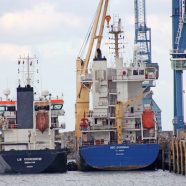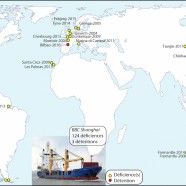Soon Kim will pick up the MOX in his binoculars
Within a few days, unless an accident occurs, the Pacific Egret will enter the North Korean missile influence area. The Pacific Egret carries 8 tons of MOX, a nuclear fuel made in France containing 8 to 10% of plutonium mixed with enriched uranium. This civil bomb left the French port of Cherbourg on July 5, 2017.
After having sailed down the Atlantic Ocean, passed off South Africa, crossed the Indian Ocean and the Pacific Ocean, the MOX is expected to be unloaded in the small private port of the Japanese nuclear power plant in Takahama, facing North Korea.
BBC Shanghai, a radioactive risk for Asia
October 2015. The BBC Shanghai, owned by Germany-based Briese Schiffahrts GmbH & Co KG, is making the headlines of the world’s maritime shipping news. She has been selected by the French nuclear operator AREVA to ship to Australia radioactive waste reprocessed in Normandy at the La Hague plant. However, the ship had a bad record regarding technical deficiencies as attested by the maritime authorities of all continents; she had been detained three times in Bilbao (Spain), Gladstone (Australia) and in March 2015 in Honolulu (Hawaii, United States). The international mobilization to demand the chartering of a safe ship will do nothing about it, the BBC Shanghai loads 25 tons of radioactive waste and leaves Cherbourg (France) on October 15 for Port Kembla near Sydney. Indonesia has denied her access to its waters. She arrived at Port Kembla on December 5 after a 25,000 km trip.
MOX : Areva’s Slip-Up and heavy sleep
Areva, a modern day pirate, keeps up maritime expeditions carrying nuclear fuels and fissile materials. The Pacific Egret is a military ship painted in blue. She disconnected her AIS on the 13th of June, 2017. An AIS (Automatic Identification System) allows one to know the position and route of a ship and is essential for maritime safety. There are no surface ships of the French Navy that currently transport cargo and a weapon as formidable as that of The Pacific Egret. Several options are possible for the seagoing voyage from Cherbourg to Japan. Once used in the bygone days of Noriega for sensitive nuclear material, the Panama Canal is no more a viable option for political reasons. Crossing the South Atlantic, Indian Ocean, and South Pacific is now the most classic way to go. With the agreement of Vladimir Putin, the Arctic North-East passage off Siberia cannot be completely excluded as an option either.
Moxquitue
Next week, MOX fuel will be loaded in Cherbourg onto the Pacific Egret or onto the Pacific Heron with the destination of the Takahama nuclear plant in Japan. MOX contains 10% plutonium and 90% uranium.
This voyage of dangerous fissile materials across the worldwide oceans causes tension and poses risks all along the track. The point of the refuge port in case of damage or fire has yet to be solved. The ability of the modest ships from Pacific Nuclear Transport Ltd to resist cyclones, tsunamis, and North Korean missiles has not been demonstrated either.
Wanted : BBC Shanghai
After unloading on December 5 in Australia what she had loaded on October 14 in France, the BBC Shanghai, an occasional nuclear waste carrier, is now heading for Shanghai. Her owner is German. She is flying the Antigua & Barbuda flag. Her profile is alarming. As soon as she is calling in a port, the BBC Shanghai is targeted by maritime authorities and submitted to a detailed inspection.
Please refer to Robin des Bois press releases :
Radioactive waste – Robin des Bois (Robin Hood) is calling for an intervention by the Australian and French governments, October 10, 2015. 7:45 pm
Radioactive waste – BBC Shanghai at Cherbourg, October 14, 2015
And the map « Das Bato », October 15, 2:00 pm on the performances of the BBC Shanghai
Das Bato
Subject: Radioactive waste – Cherbourg => Australia. 25,000 km to Port Kembla, near Sydney.
Panorama of the performances of BBC Shanghai, German shipowner, German classification society (Germanischer Lloyd).
« The company and the ship meet all current national and international regulations concerning nuclear safety » according to AREVA.
The BBC Shanghai is hunt down throughout the world. Cherbourg let her go with a shipment of nuclear waste.
Radioactive waste : Cherbourg / Australia
A post-Fukushima realtime test is underway at the Areva reprocessing plant in La Hague, near Cherbourg. Safety is the priority, according to the director of the La Hague nuclear site.
In the same time, the BBC Shanghai is docked at Areva’s terminal in the Cherbourg harbor. She is preparing to be loaded with radioactive waste resulting from reprocessing of Australian spent fuel. This isn’t simulation, but the truth, a sad truth that is a significant safety risk. The most recent bad news to add to the BBC Shanghai’s heavy « criminal record » are 4 deficiencies on August 6, 2015 at Busan, South Korea and 6 deficiencies in Russia on August 11. The Tokyo Memorandum of Understanding, an Asia-Pacific regional agreement on maritime security, classifies the BBC Shanghai as a high-risk ship. Australia, the BBC Shanghai’s country of destination, is a signatory of the Tokyo Memorandum.
Radioactive waste – Robin des Bois (Robin Hood) is calling for an intervention by the Australian and French governments
Robin des Bois confirms the information from Greenpeace about the condition of the ship BBC Shanghai. Areva made a very bad choice in selecting her to ship back the Australian nuclear waste. These waste were produced at the La Hague plant near Cherbourg through the reprocessing of spent fuel from the Australian atomic research reactor HIFAR (High Flux Australian Reactor). The first shipment to France dates back to January 2000. At the time, COGEMA, Compagnie Générale des Matières nucléaires, which became Areva in 2006, put forward the French flag of the chartered ship, the Bouguenais, as well as the French nationality of 5 crewmembers and the presence of an officer in charge of the radioprotection on board. In spite of these positive elements, the choice of the Bouguenais was nevertheless already questionable (1).













